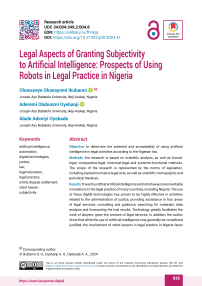Legal Aspects of Granting Subjectivity to Artificial Intelligence: Prospects of Using Robots in Legal Practice in Nigeria
Автор: Ikubanni O. O., Oyebanji A. O., Оyebade A. A.
Журнал: Journal of Digital Technologies and Law @lawjournal-digital
Статья в выпуске: 2 (4), 2024 года.
Бесплатный доступ
Objective: to determine the potential and acceptability of using artificial intelligence in legal activities according to the Nigerian law. Methods: the research is based on scientific analysis, as well as formal-legal, comparative-legal, historical-legal and systemic-functional methods. The scope of the research is represented by the norms of legislation, including expired normative legal acts, as well as scientific monographic and periodical literature. Results: It was found that artificial intelligence and robot lawyers are inevitable innovations in the legal practice of many countries, including Nigeria. The use of these digital technologies has proven to be highly effective in activities related to the administration of justice, providing assistance in four areas of legal services: consulting and guidance, searching for materials, data analysis and forecasting the trial results. Technology greatly facilitates the work of lawyers, given the amount of legal services. In addition, the author show that while the use of artificial intelligence may generally be considered justified, the involvement of robot lawyers in legal practice in Nigeria faces both legal and ethical barriers. The laws on legal education and legal practice in force in this country do not recognize robot lawyers as persons licensed to practice law in Nigeria. Robot lawyers must be given the status of a person before they can fully implement their potential in the legal practice of Nigeria. Scientific novelty: this is primarily due to the formulation of a research task to determine the possibility of a robot acting as a practicing lawyer within the legal framework in Nigeria. Practical significance: the conclusions formulated in the paper, namely, the inevitability of using artificial intelligence and robot lawyers in legal practice and the current legislation governing legal practice in Nigeria, will be useful when considering amendments to legislation in order to adapt it to the current level of digital technology development.
Artificial intelligence, automation, digital technologies, justice, law, legal education, legal practice, online dispute settlement, robot lawyer, subjectivity
Короткий адрес: https://sciup.org/14131254
IDR: 14131254 | УДК: 34:004:349.2:004.8 | DOI: 10.21202/jdtl.2024.41


